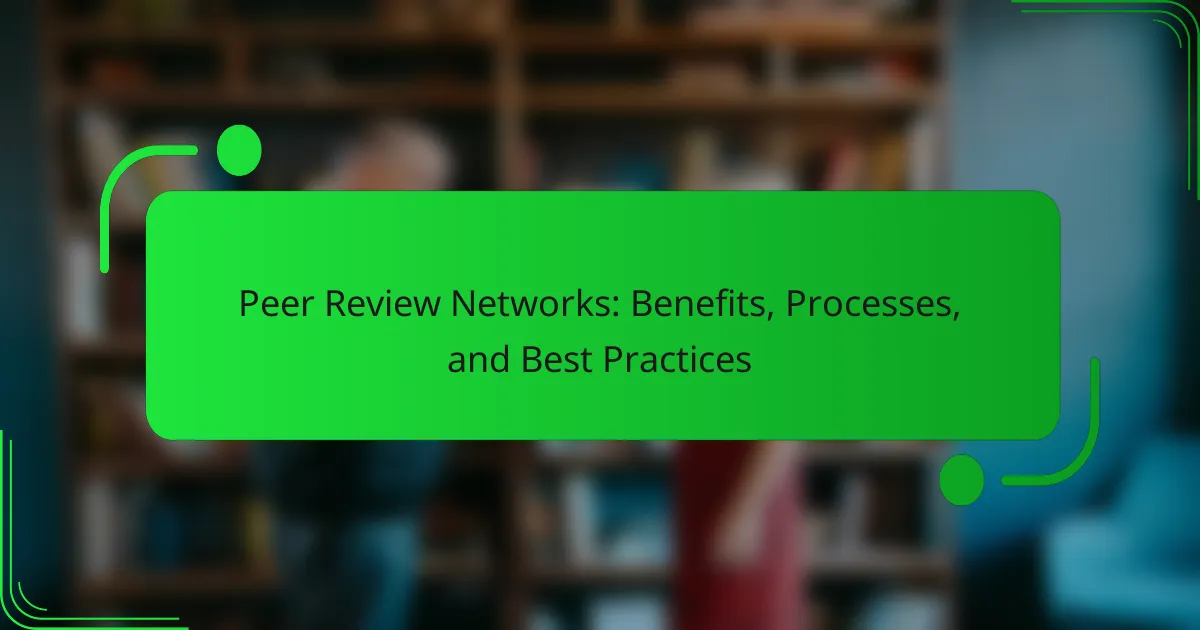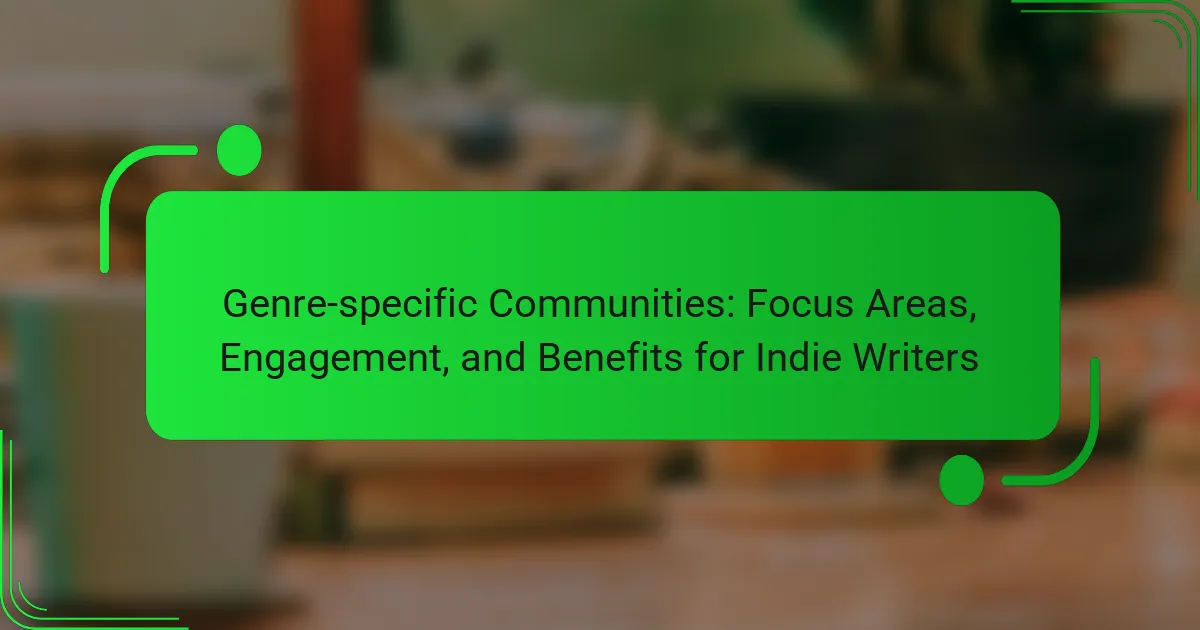Connecting with book clubs can significantly enhance an indie author’s visibility and reader engagement. This article explores effective strategies for outreach, the role of social media and Goodreads in promotion, and methods for gathering valuable feedback. Authors will learn how to build relationships with club leaders, offer tailored content, and measure the impact of their efforts. Engaging with book clubs provides a unique opportunity for indie authors to connect with their audience and improve their craft.
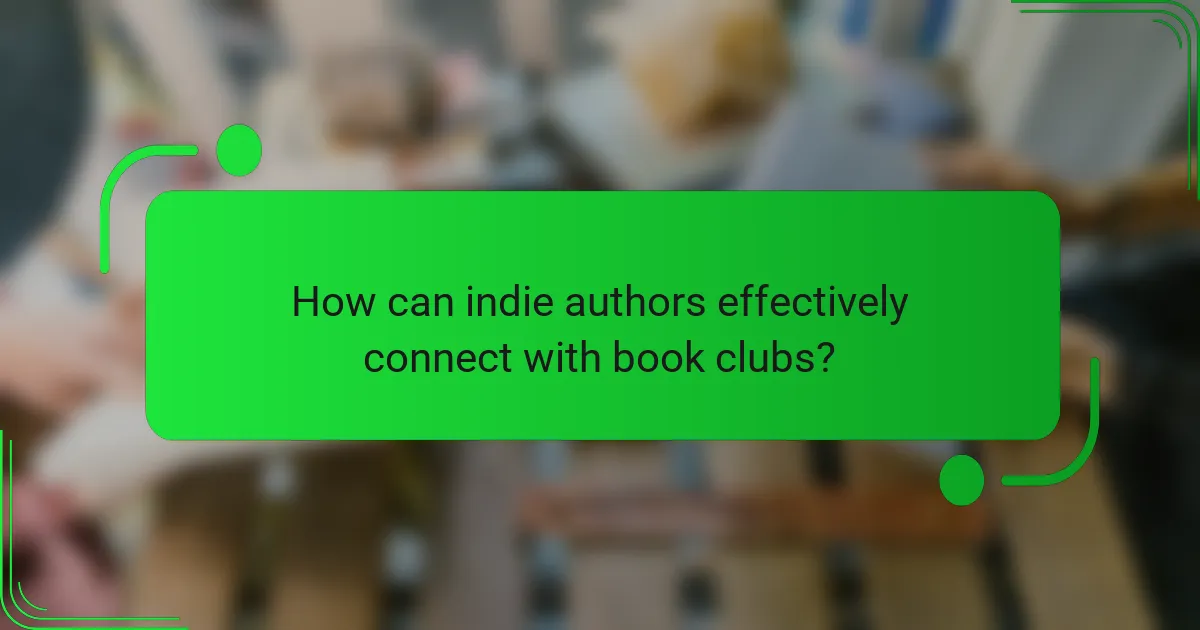
How can indie authors effectively connect with book clubs?
Indie authors can effectively connect with book clubs by actively engaging with members and offering tailored content. Establish a presence on social media platforms where book clubs gather. Reach out directly to clubs with personalized invitations to discuss your book. Offer exclusive content, such as Q&A sessions or discussion guides, to enhance their reading experience. Encourage feedback to foster a sense of community and improve future works. Building relationships with book clubs can significantly expand an author’s audience and visibility.
What strategies can authors use to identify suitable book clubs?
Authors can identify suitable book clubs by researching online platforms, engaging with local libraries, and connecting with fellow authors. Focus on clubs that align with the book’s genre and themes. Utilize social media groups dedicated to reading communities for tailored recommendations. Attend book events to network and gather insights on active clubs.
How can authors approach book clubs for collaboration?
Authors can approach book clubs for collaboration by offering to participate in discussions, providing free copies of their books, and engaging with members through Q&A sessions. This fosters relationships and encourages feedback. Building connections with local clubs can enhance visibility and create opportunities for promotion. Consider tailoring your approach to the club’s interests to ensure a meaningful collaboration.
What role do social media platforms play in connecting with book clubs?
Social media platforms serve as vital tools for indie authors to connect with book clubs. They facilitate direct communication, enabling authors to share their work and engage with readers. Platforms like Facebook and Instagram allow authors to promote book club events, share updates, and gather feedback. Additionally, hashtags and groups dedicated to reading can enhance visibility and foster community interaction. This online presence can significantly increase readership and create lasting relationships with book clubs.
How can in-person events enhance connections with book clubs?
In-person events significantly enhance connections within book clubs by fostering direct interactions among members. These gatherings allow for deeper discussions, personal engagement, and the opportunity to share insights about books. Additionally, they create a sense of community, encouraging members to form lasting relationships. Engaging activities, such as author Q&A sessions or themed discussions, can further enrich the experience, making it memorable and impactful.
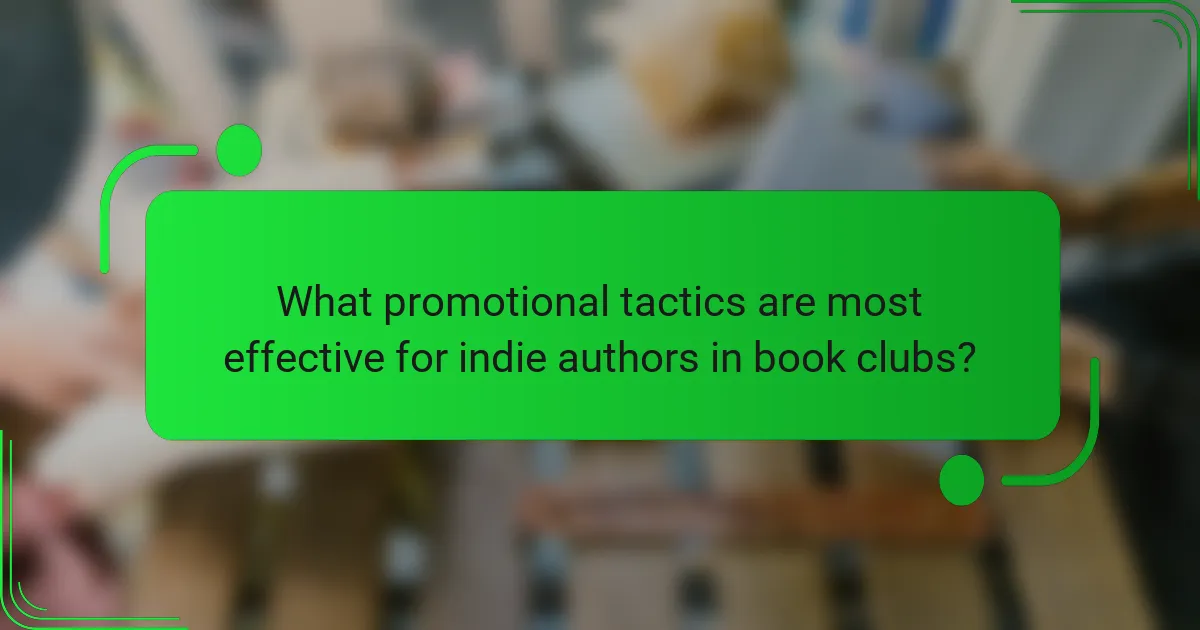
What promotional tactics are most effective for indie authors in book clubs?
Indie authors can effectively use targeted outreach, personalized messaging, and exclusive content to engage book clubs. Building relationships with club leaders fosters trust and increases visibility. Offering free copies or discounts incentivizes participation. Hosting virtual Q&A sessions enhances interaction and feedback.
How can authors leverage book club discussions for promotion?
Authors can leverage book club discussions for promotion by engaging directly with readers and fostering community. This interaction builds relationships and encourages word-of-mouth marketing.
Participating in book clubs allows authors to gain valuable feedback, which can inform future projects. Authors can also provide exclusive content or host Q&A sessions to enhance the reading experience.
Utilizing social media to share book club insights can expand reach and attract new readers. Authors may consider creating a dedicated space for book clubs on their websites, offering resources and discussion guides.
By actively participating in discussions, authors can establish themselves as approachable and invested in their readers’ experiences.
What are the benefits of offering exclusive content to book clubs?
Offering exclusive content to book clubs enhances engagement and fosters community. Exclusive materials such as author interviews or discussion guides deepen readers’ connections with the book. This unique attribute encourages participation and feedback, allowing authors to refine their work based on reader insights. Additionally, it promotes word-of-mouth marketing, increasing visibility and sales for indie authors.
How can authors utilize book club reviews in their marketing?
Authors can leverage book club reviews to enhance their marketing efforts by using feedback to improve their work, engage with readers, and create targeted promotional strategies. Positive reviews can be shared on social media and websites to build credibility.
1. Collect feedback: Encourage book clubs to provide detailed reviews, highlighting strengths and areas for improvement.
2. Engage with readers: Respond to reviews, fostering a connection with the community and showing appreciation for their insights.
3. Create promotional content: Use quotes from reviews in marketing materials, such as newsletters and social media posts.
4. Target specific audiences: Analyze reviews to identify themes that resonate with readers, tailoring future marketing efforts accordingly.
Utilizing book club reviews not only boosts visibility but also helps authors refine their craft based on reader preferences.
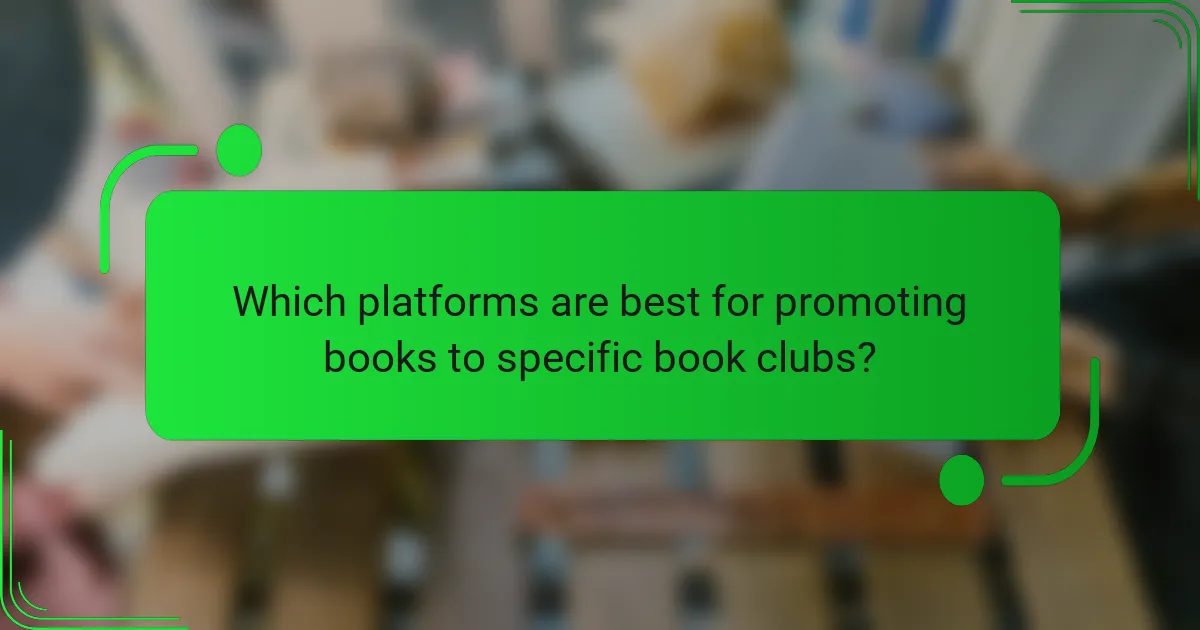
Which platforms are best for promoting books to specific book clubs?
Social media platforms, Goodreads, and author websites are effective for promoting books to specific book clubs. Social media allows targeted outreach, while Goodreads connects authors with readers through community features. Author websites provide a direct channel for engagement and feedback.
What online resources can help authors find niche book clubs?
Online resources for authors to find niche book clubs include platforms like Goodreads, Facebook Groups, and Meetup. These sites host communities tailored to specific genres and interests, allowing authors to connect with engaged readers. Additionally, sites like Book Clubz offer features for authors to promote their work and gain valuable feedback. Engaging with these platforms can help indie authors reach targeted audiences effectively.
How do regional preferences influence book club choices?
Regional preferences significantly shape book club selections by reflecting local culture and interests. Members often gravitate towards titles that resonate with their community experiences. For example, clubs in urban areas may prefer contemporary fiction, while those in rural regions might favor classic literature. Regional book trends can also influence the choice of genres, with some areas showing a strong preference for specific themes such as historical narratives or regional authors. Understanding these preferences helps indie authors tailor their promotions and engage effectively with local book clubs.

What feedback mechanisms should authors implement with book clubs?
Authors should implement regular surveys, discussion prompts, and feedback sessions with book clubs. These mechanisms foster engagement and provide valuable insights into reader preferences and experiences.
Surveys can gather quantitative data on enjoyment, themes, and character development. Discussion prompts encourage deeper analysis and facilitate meaningful conversations. Feedback sessions allow for direct interaction, enabling authors to clarify intentions and gather qualitative insights.
By integrating these feedback mechanisms, authors can strengthen their connection with readers and enhance their future works.
How can authors encourage constructive feedback from book club members?
Authors can encourage constructive feedback from book club members by fostering an open dialogue. Create a welcoming environment where members feel comfortable sharing their thoughts.
Provide specific questions or prompts related to the book to guide discussions. This helps focus feedback on key aspects like character development or plot pacing.
Consider hosting a Q&A session after the book discussion, allowing members to express their views directly.
Lastly, express gratitude for their insights, reinforcing that their feedback is valued and essential for your growth as an indie author.
What are the best practices for incorporating feedback into future works?
Incorporating feedback into future works enhances an indie author’s writing. Start by analyzing feedback for common themes, focusing on constructive criticism. Engage with book club members to gather insights on characters, pacing, and plot. Implement changes based on feedback in the next draft. Lastly, thank contributors, fostering a supportive community that encourages ongoing dialogue.
How can authors maintain ongoing relationships with book clubs for future projects?
Authors can maintain ongoing relationships with book clubs by engaging actively and providing value. Regular communication fosters connection and trust.
1. Schedule regular check-ins via email or social media.
2. Offer exclusive content, such as sneak peeks of upcoming projects.
3. Encourage feedback by asking specific questions about their reading experience.
4. Host virtual or in-person events to discuss books and share insights.
5. Create a newsletter to keep clubs informed about new releases and events.
6. Show appreciation through personalized notes or discounts on future books.

What are the unique challenges indie authors face with book clubs?
Indie authors face unique challenges with book clubs, primarily due to limited visibility and resources. Many book clubs prefer established authors, making it harder for indie writers to gain traction. Building relationships with clubs requires proactive engagement, which may be daunting without prior connections. Additionally, indie authors often lack marketing budgets, limiting promotional efforts. Feedback can be inconsistent, as clubs may not prioritize indie titles. These factors create barriers to participation and recognition in the book club community.
How can authors overcome common misconceptions about indie publishing in book clubs?
Authors can overcome misconceptions about indie publishing in book clubs by actively engaging with members and sharing their unique perspectives. Building relationships is essential; authors should attend meetings, listen to feedback, and participate in discussions. This fosters trust and opens channels for promotion. Providing clear information about the indie publishing process helps dispel myths, while highlighting success stories showcases the potential of indie authors. Additionally, offering exclusive content, such as Q&A sessions or signing events, can enhance the appeal and encourage book clubs to consider indie works.
What strategies can authors use to address varying reading preferences among book club members?
Authors can address varying reading preferences among book club members by offering diverse book selections, facilitating open discussions, and providing tailored reading guides. Engaging members through surveys can also help identify interests and preferences. This approach fosters inclusivity and encourages participation.
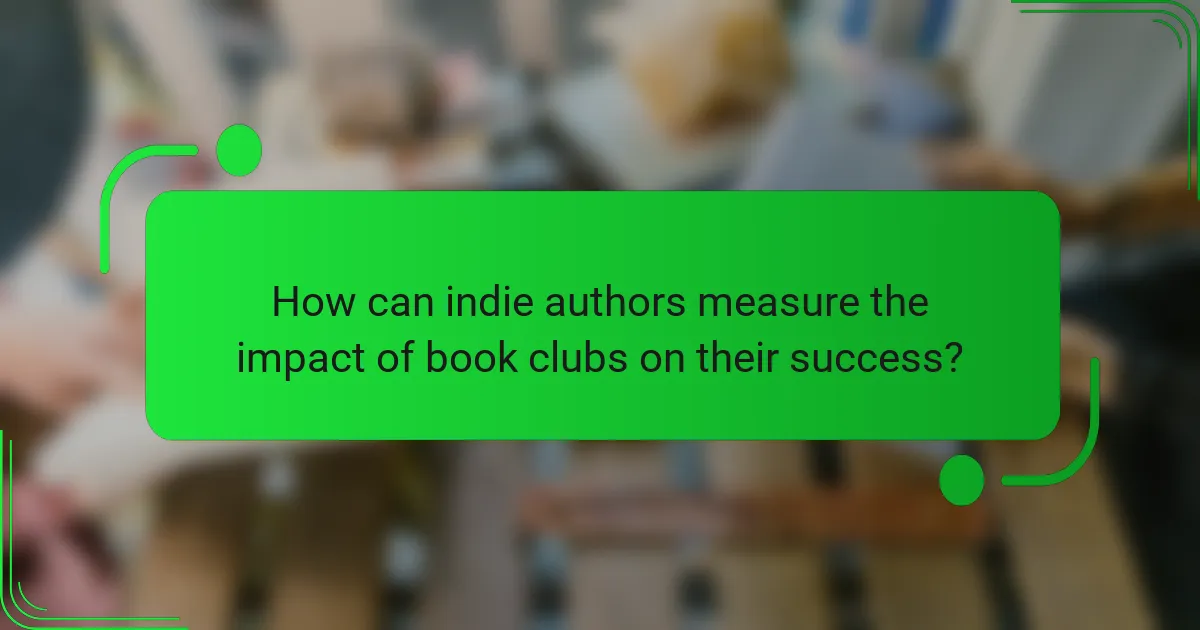
How can indie authors measure the impact of book clubs on their success?
Indie authors can measure the impact of book clubs by tracking engagement metrics, sales data, and feedback. Book clubs often provide valuable insights into reader preferences and trends. Authors should consider the following methods:
1. Monitor book sales before and after club discussions to identify potential spikes.
2. Collect qualitative feedback through surveys or discussions post-meeting.
3. Analyze social media mentions and reviews related to the book club’s activities.
4. Establish direct communication with clubs to gauge their overall satisfaction and suggestions.
These strategies help authors understand how book clubs influence their visibility and reader engagement.
What metrics should authors track to evaluate engagement with book clubs?
Authors should track metrics such as book club participation rates, feedback quality, social media mentions, and discussion engagement to evaluate engagement. Monitoring these metrics helps identify reader interests and improve future interactions.
| Metric | Description |
|—————————-|——————————————-|
| Participation Rate | Number of clubs reading the book |
| Feedback Quality | Depth and constructiveness of responses |
| Social Media Mentions | Frequency of book mentions online |
| Discussion Engagement | Level of interaction during meetings |
How can authors assess the effectiveness of their promotional efforts with book clubs?
Authors can assess their promotional efforts with book clubs by gathering feedback through surveys and discussions. Engaging with readers directly allows authors to understand what resonates and what does not. Tracking book sales and social media interactions can provide quantitative data on the effectiveness of promotional strategies. Additionally, monitoring participation rates in book club events can offer insights into audience engagement and interest levels.

What are the key takeaways for indie authors engaging with book clubs?
Engaging with book clubs allows indie authors to connect with readers, promote their work, and receive valuable feedback. Authors should focus on building relationships, participating in discussions, and offering unique insights into their writing process.
1. Build relationships: Foster connections by attending book club meetings or engaging online.
2. Promote effectively: Share promotional materials like bookmarks or discussion guides to enhance visibility.
3. Encourage feedback: Create an open environment for constructive criticism to improve future works.
4. Offer exclusives: Provide book club members with early access to new releases or exclusive content.
5. Tailor discussions: Customize topics to align with the club’s interests, enhancing engagement and relevance.
What expert tips can enhance an indie author’s experience with book clubs?
Engaging with book clubs can significantly enhance an indie author’s experience. To connect effectively, consider these expert tips:
1. Research local book clubs and reach out to them directly.
2. Offer to participate in discussions or Q&A sessions.
3. Provide advance copies of your book for members.
4. Create discussion guides to facilitate conversations.
5. Leverage social media to promote your involvement.
6. Gather feedback to improve your writing and future works.
These strategies help build relationships and increase visibility within the reading community.
What common mistakes should authors avoid when working with book clubs?
Authors should avoid overstepping boundaries and neglecting feedback when engaging with book clubs. They should refrain from dominating discussions and instead encourage open dialogue. Additionally, failing to research the club’s preferences can result in mismatched expectations. Ignoring the importance of follow-up communication can hinder future opportunities for collaboration. Lastly, being unprepared for discussions can diminish the author’s credibility and connection with readers.

